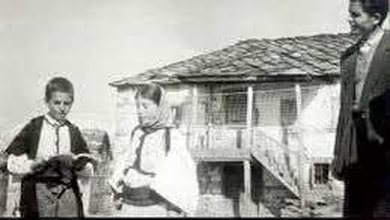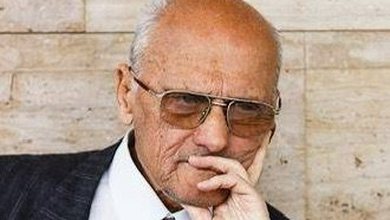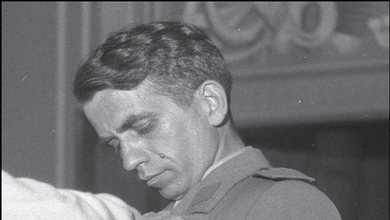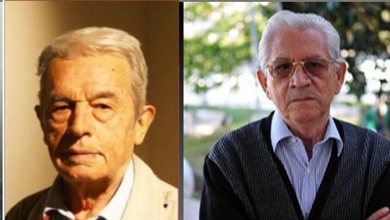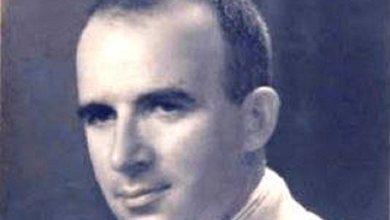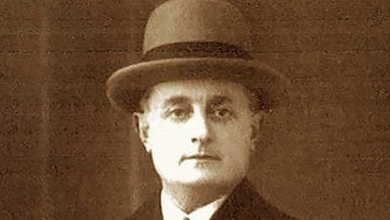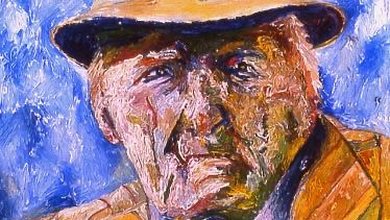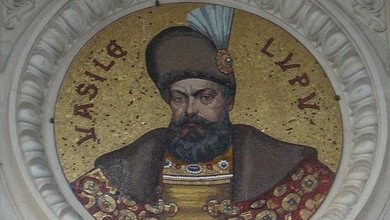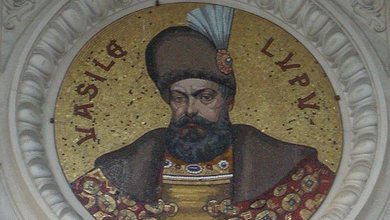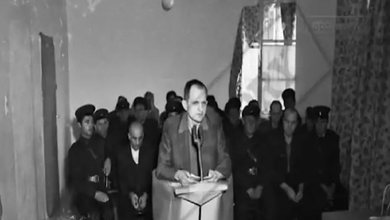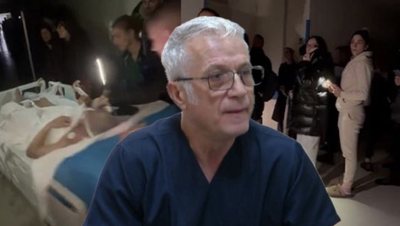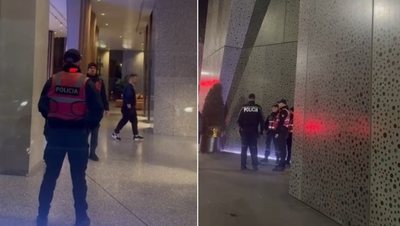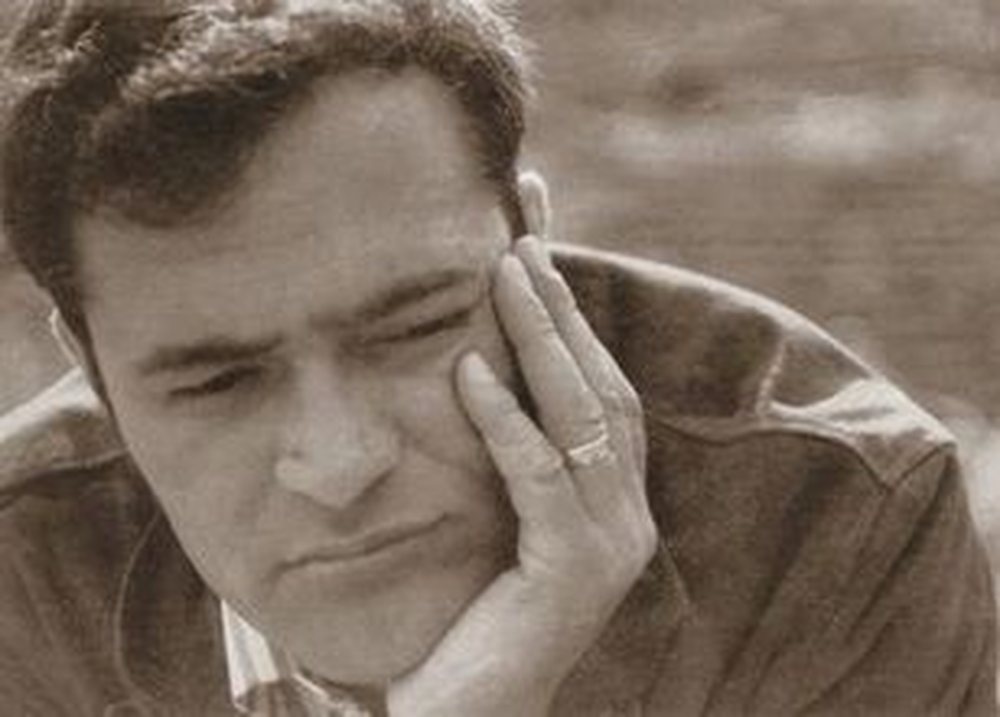
I had heard and read so much about the esteemed professor Ukshin Hoti, but I had never had the chance to meet him. I met him for the first time in the “Dubrava” prison in Burimi (Istog). At first, we could see each other from afar from the pavilion promenades. I was in Pavilion C-1 and he was in the reception pavilion. Even from this distance, we had no difficulty (since we were here) in distinguishing him: seven feet tall, broad-shouldered, slightly stooped and almost always with a haze of smoke around him, from his heavy smoking. Fate decreed that when they brought him to our pavilion, we would find ourselves in the same room, until a bed became available in the overcrowded rooms.
This intellectual with a wide range of knowledge in different fields and a rare depth of judgment, at first, gave the impression of a gloomy, withdrawn, and uncommunicative man. But, in fact, in the long discussions and polemics we had in prison, he was very active, strict, and uncompromising.
Another characteristic that was easily discernible was that he was deeply troubled by his family situation, which was fraught with numerous problems. He was particularly distressed by the suffering of his three children, due to the separation from his two wives. The extent of this pain was magnified even more when his son, Andini, visited him.
When he returned to the ward, after each visit, he would comment on Andini's mental and physical condition. He seemed to be in a bad mood, that he was slowly growing older and that every day he was becoming more and more stubborn. He was extremely worried about him. But above all, his rebellious spirit attracted attention. His character did not allow an indifferent contemplation of all those injustices that were done to political prisoners, as well as ordinary ones, and he did not hesitate to go on a hunger strike for them.
Things got to the point where the prison superiors could no longer tolerate this incorrigible rebel. That's why they will transfer him to the Niš prison. There, he will continue to run the prison in his own way, which was not ordinary from the perspective of those who make diabolical plans.
The letters he wrote to his sister Myrveta (now published and known to the general public), and his dignified attitude towards them, disturbed the spirits of the prison superiors. And, undoubtedly, also the prison officials at the highest levels of the Serbian state. For this reason, they will transfer him to the prison in Mitrovica Srem.
50 days under torture and loneliness...!
In the prison of Mitrovica in Srem, he was waiting for one of the most cruel directors that one encounters in prisons, wherever they are. For the tortures he had inflicted on Croatian political prisoners, it was said that he was also accused by the International Tribunal in The Hague. He organized the same bestial tortures for us Albanians to whom we had been transferred since April 30, 1998 and those who had arrived later. Especially the group headed by Nait Hasani, and Professor Ukshin will also be subjected to these tortures, for about fifty days in a row, during which they will keep him in solitary confinement.
Later, when we would meet in a shared room, he would tell us about the cruelty that was done to him: "From the powerful and uncontrolled falls, at first it seemed to me that one arm went, then the other, later my back, my legs... I simply had the feeling, and I was convinced, that they had decided to kill me, by torturing me."
And after all this, he will no longer be brought to a common room with us Albanian political prisoners, but will be placed in a place with other prisoners, for various ordinary crimes, of different nationalities. In fact, even though we were in complete isolation, he would have an easier time in society with us, than with those prisoners dominated by Serbian criminals, but who had a treatment where they were freer.
The news about the NATO attacks was given to us by Professor Ukshini
We were together (a total of 44 Albanian political prisoners), even two days after the start of NATO bombing of Serbian targets, when they brought Professor Ukshin to our room, on which occasion he gave us the joyful news of that attack, so awaited by the Albanians. They will keep us there until April 26, 1999, when they will transfer us to the prison of Niš, just as infamous as the one in Mitrovica e Srem. In Niš, the “revelation” will await us, composed of almost the entire potential of the guards of that prison.
“Exploitation” is a method of torture where the guards are lined up in two rows and the prisoner must pass through these two rows. The police shoot wherever, however, and as much as they want, until they are satisfied. It was a truly brutal beating where, in addition to the usual kicks and rubber batons, simple sticks, baseball bats, and iron bars were also used during the beating. A lot of blood flowed and bones were broken. Woe to the one who fell! A prisoner had to risk himself even more to get out of such a situation, because the falls did not stop. Many prisoners fainted.
Professor Ukshin's turn also came. In that mess, at first those who were carrying as much as they could did not notice him. But when one of them recognized that it was the professor, he joyfully shouted: "Look, look! The professor is back!" And the rain fell on him even more forcefully than before. When the professor heard that ironic remark, as he was hunched in a defensive position, he straightened up and proudly and stoically walked forward, facing all those blows! That night they would beat us several more times in a row and divide us into two large rooms. The professor was placed in the other room.
Then they would torture us several more times over the course of two more days and two nights, until the morning of April 29, when they would order us to get ready for a new transfer. The prisoner never knows when and where he will be transferred. He is constantly haunted by curiosity, accompanied by fear that he will be worse off than before. This enigma, what would happen to us in those extremely dramatic circumstances, when Serbia was in its final throes, weighed heavily on our minds. We were even more troubled by the fact that it had only been three nights since they had brought us to Niš. Where are they taking us?!
Just like in Mitrovica Srem, here too, they tied our hands behind our backs, each one separately, and then they tied us all together with a long chain, which they also reinforced with bus seats. The transfer was not only for those of us who had come from Mitrovica Srem, but for all those political prisoners who had been in the infamous Niš prison. Three buses were filled with prisoners.
Professor Ukshini was one chair ahead of me, but we didn't manage to exchange a single word on the way, because not only were we not allowed to speak, but we also had to keep our heads so low that we couldn't see anything, otherwise cruel beatings would follow. The next day the riddle was solved: we arrived at the "Dubrava" prison, exactly one day before the one-year anniversary since we had been taken from this prison.
We all knew: they had brought us there for our own harm.
The return to Dubrava surprised everyone. We all gave some possible version of why we had been returned there. We all knew one thing: we had been brought there for our own harm. A year ago, from here they had distributed us to various prisons throughout Serbia, with the excuse that there was no safety for us in Dubrava, and now they returned us and gathered us there, in the greatest possible insecurity, at a time when the KLA was much stronger than a year ago, NATO was attacking incessantly from the air and, at that time, when the Serbian army was committing the greatest crimes against the Albanian population.
In fact, we knew that after our transfer from Dubrava, instead of prisoners, they had brought Serbian paramilitaries, specifically Arkan's "Tigers". Whereas, before we returned to, they had removed them. And in this regard, the Serbian bloodthirsty had made their calculations meticulously. Seeing that the Serbian military base, the strongest in the Dukagjini Plain, centered in the Dubrava prison directorate, had also come to be bombed, they had brought us so that, in the event of a bombardment, the paramilitaries would not suffer, but the prisoners. We felt this danger, but we had nothing to do, except wait for everything to happen to us.
In these circumstances, we were undoubtedly tense even though we were in Kosovo. Professor Ukshini had one more reason to feel bad spiritually, because he had one more puzzle: how would he manage to return to his family after his release, or to a safe place, or simply where would he be able to continue his life after prison?
He, like the rest of us, had no way of knowing anything about his family and relatives. Even from the little information I managed to get from an ordinary prisoner who worked in the kitchen, we were unable to form even a superficial picture of the situation.
From those small letters, so dangerous to get to me, we could understand that a fierce war was being waged, from the air and from the ground, and that many Albanians had been displaced and many had been killed and massacred. I told the professor and those I trusted, but this news worried and made the professor even more nervous.
"I have definitely decided on a job: I will go straight to my Krusha, and that's it! From the day we returned, he only had 18 days left until his release, and every day that approached he was more worried. How, and where to shock him?! Finally he told us: "I have definitely decided on a job: I will go straight to my Krusha, and that's it"!
The moment of his release came suddenly. The exact time is not known in prison, because it is not allowed to keep a watch, but it must have been between 10 and 11 am, on Sunday morning (!!!), May 16, 1999, that is, one day before the deadline. The fact that he was released on Sunday was surprising.
It is not allowed by any norm, nor has it ever happened, for anyone to be released on Sundays. If someone's release date falls on a Sunday, then that prisoner is released the day before. This happened to me when I was first released from Pozharavac prison, where instead of being released on Sunday, October 14, 1990, I was released on Saturday, October 13.
Someone entered our room and announced that our uncle Ukë was going home and that the supervisor (“nadzorniku”) of our pavilion, Branku, had come with the supervisor of Pavilion C-1 to take him out of prison. This meant a high-level and unusual escort. In fact, judging by the words of a guard, who was almost the only one who still behaved correctly with some of us who had been in Dubrava for years, regarding the date and manner of the professor's release, a special meeting was held and there was a long debate about what to do with him. Otherwise, there is no way to explain his words, when 3-4 days before the day of his release from prison, he says: “Well, professor, we have decided to release you, let him go wherever he wants.”
"I want to greet you with just one: Goodbye!"
As soon as I received the news that he was being released from prison, I quickly decided to go and say goodbye to him, because when the guards arrive to take the prisoner, they don't allow you to say goodbye to him, as your heart desires. I also knew that during the goodbye there would be a crowd. We had a wall between the rooms. I also invited Nait Hasan and we went into his room. He had been in the room walking and listening to the comments of his "cellmates".
I, too, as soon as I entered the room, more to give him courage, in the room, more to tell him that; it seems it's a good sign that they came on Sunday to release you, since this must be the insistence of the International Red Cross and with them, for sure, your sister Myrvetja also came. In fact, I told him something that we wanted to do, and that we had said before.
Whatever it was, this had a positive effect on his mood in those moments of anxiety, for all of us. And we immediately said goodbye. As soon as someone wanted to say goodbye to him, he said: "No, I don't want to say goodbye to anyone anymore, because I don't want to take this as a farewell, since soon, you will all be coming, so I just want to say goodbye to you."
He understood this as his attempt to give us courage. We then left the room and until departure he was alone with his “roommates”. After a few minutes, the respected professor Ukshin Hoti, accompanied by two supervisors, would head towards the prison exit doors. And we never saw him again.
In fact, ordinary prisoners who worked outside would tell us that they had seen the professor, even when he had passed outside the inner walls of the prison. Nothing more. After a few days, word spread that the International Red Cross had supposedly tracked him all the way to Italy, and we were all overjoyed that the man who Kosovo needed so much had finally escaped the clutches of the criminal regime.
In fact, we believed this untruth so much that when NATO bombed the prison on May 19, we were surprised how the professor had failed to inform certain international circles that we, the Albanian prisoners, were now in prison, not the Serbian paramilitaries. We could not have known that once the professor had passed the prison walls, all traces of him would be lost and no one would know anything about him, let alone that he was alive.
And, really, where could Ukshin Hoti be?
When we were transferred to Lipjan prison (after the massacre in Dubrava), an ordinary Albanian prisoner, who was cleaning the corridor and toilets of our pavilion, one day, around June 5, 1999, comes and tells me in secret, from the others: “I heard two guards saying to each other: Oh, the army killed him, he just left 300 meters from the prison”! Then, he adds that the guards did not notice him, where he had eavesdropped on them. Therefore, it cannot be taken as a provocation against him.
Videotapes – analogies and guesses
Exactly 300 meters from the prison, around September 1999, a body was found. This could be a coincidence. But Ukshin's brother and son-in-law had recorded (filmed) this body with a camera. They came to me, at my house, so that while watching the videotape, I could tell them something, because I didn't remember any clothes that the professor had been wearing. And, surprisingly, many things matched the clothes that Ukshin Hoti had in prison. Again, it could be a coincidence, but the shoes that I saw on the videotape were similar, if not identical, to Ukshin Hoti's.
The jeans could also have been the same. They reminded me of a case I knew all too well when a prisoner had given a pair to the professor a few days before he was released from prison. The corpse I saw on the videotape had a distinctive sweater, just like the professor had and wore.
The only clothing that I don't remember resembling his clothes was a leather jacket. The length of the body was also similar, if not the same, as the professor's. Ukshin Hoti's brother, Afrimi, told me that he was also concerned about one issue regarding the body: the body of his other brother Ragip, who had already been found earlier, had his head cut off.
This coincidence of the headless corpse, also found and filmed 300 meters from the prison, worried him immensely. Could this have been a special signal!!! With all these assumptions, conjectures and coincidences, which close the paths to hope, there are also voices in our information media, which give us encouragement that one day the professor will return to Kosovo, which he loved so much and did so much for. I hope that these, which are said and written in various information media, in favor of his return, become reality as soon as possible. Kosovo needs Ukshin Hoti. Undoubtedly, it needs him a lot. / Memorie.al


